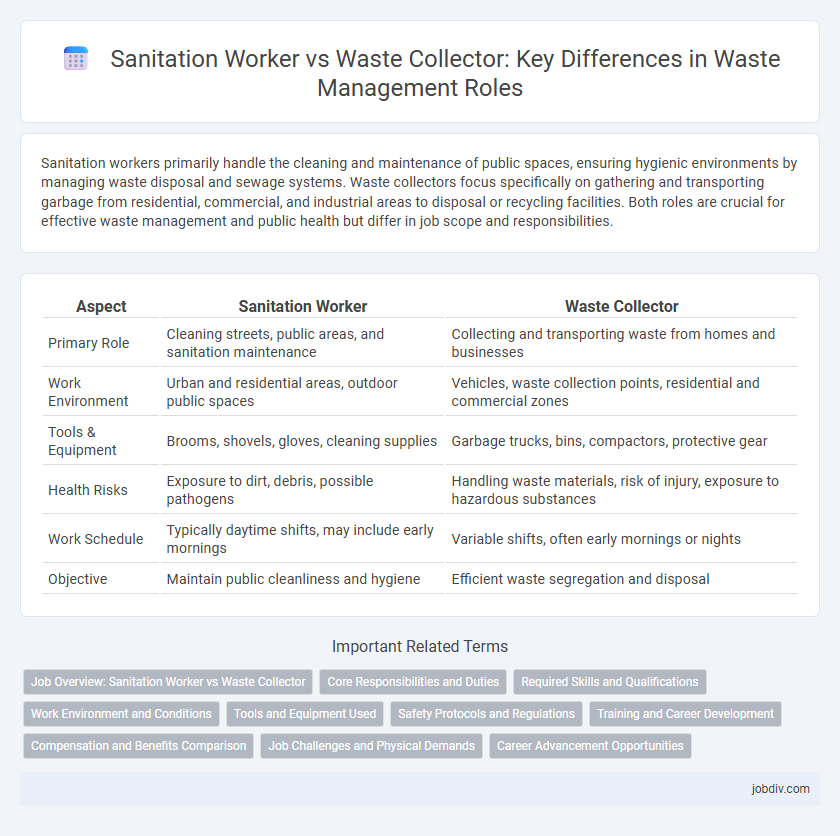Sanitation workers primarily handle the cleaning and maintenance of public spaces, ensuring hygienic environments by managing waste disposal and sewage systems. Waste collectors focus specifically on gathering and transporting garbage from residential, commercial, and industrial areas to disposal or recycling facilities. Both roles are crucial for effective waste management and public health but differ in job scope and responsibilities.
Table of Comparison
| Aspect | Sanitation Worker | Waste Collector |
|---|---|---|
| Primary Role | Cleaning streets, public areas, and sanitation maintenance | Collecting and transporting waste from homes and businesses |
| Work Environment | Urban and residential areas, outdoor public spaces | Vehicles, waste collection points, residential and commercial zones |
| Tools & Equipment | Brooms, shovels, gloves, cleaning supplies | Garbage trucks, bins, compactors, protective gear |
| Health Risks | Exposure to dirt, debris, possible pathogens | Handling waste materials, risk of injury, exposure to hazardous substances |
| Work Schedule | Typically daytime shifts, may include early mornings | Variable shifts, often early mornings or nights |
| Objective | Maintain public cleanliness and hygiene | Efficient waste segregation and disposal |
Job Overview: Sanitation Worker vs Waste Collector
Sanitation workers primarily handle the cleaning and maintenance of public areas, ensuring the removal of litter, debris, and hazardous waste to promote public health. Waste collectors focus on the systematic collection and transportation of residential, commercial, and industrial waste to recycling centers or landfills. Both roles are critical in waste management systems, contributing to environmental sanitation and efficient waste disposal processes.
Core Responsibilities and Duties
Sanitation workers primarily focus on maintaining cleanliness in public spaces by removing litter, cleaning streets, and managing the safe disposal of hazardous waste to prevent health hazards. Waste collectors are responsible for the systematic collection, transportation, and delivery of residential and commercial solid waste to disposal or recycling facilities. Both roles are crucial in waste management but differ in operational scope, with sanitation workers emphasizing environmental hygiene and waste collectors concentrating on efficient waste logistics.
Required Skills and Qualifications
Sanitation workers require skills in operating cleaning equipment, understanding safety protocols, and managing hazardous materials, often needing certifications in waste handling and public health standards. Waste collectors must have physical stamina, route navigation abilities, and knowledge of waste segregation regulations, with qualifications typically including a valid driver's license and training in environmental compliance. Both roles demand teamwork, attention to detail, and adherence to local municipal waste management policies to ensure effective and safe disposal practices.
Work Environment and Conditions
Sanitation workers typically operate in public spaces such as streets, parks, and residential areas, often facing exposure to harsh weather conditions, hazardous materials, and heavy physical labor. Waste collectors largely work within urban environments, handling garbage bins and containers on fixed routes with strict time schedules, frequently encountering traffic and sanitation hazards. Both roles demand adherence to safety protocols and the use of protective gear to mitigate risks associated with waste handling and disposal.
Tools and Equipment Used
Sanitation workers primarily use brooms, dustpans, gloves, and protective gear such as masks and boots for cleaning streets and public areas, while waste collectors operate specialized vehicles like garbage trucks, dumpsters, and compactors to gather and transport waste. Sanitation workers rely on manual tools for debris removal, whereas waste collectors depend on mechanized equipment for efficient large-scale waste handling. Both roles require the use of safety equipment to ensure hygiene and protect against hazardous materials during their duties.
Safety Protocols and Regulations
Sanitation workers adhere to strict safety protocols, including the use of personal protective equipment (PPE) such as gloves, masks, and high-visibility clothing to minimize exposure to hazardous materials and reduce injury risks. Waste collectors follow regulations set by occupational safety agencies, emphasizing proper handling, sorting of waste, and adherence to transportation guidelines to prevent contamination and accidents. Both roles require continuous training on updated safety standards to ensure compliance with local and international environmental health regulations.
Training and Career Development
Sanitation workers receive specialized training in safe waste handling, hazardous material identification, and public health standards, enhancing their ability to manage sanitation infrastructure efficiently. Waste collectors typically undergo practical training focused on waste gathering techniques, route management, and customer service to optimize collection efficiency. Career development for sanitation workers often includes opportunities for advancement into supervisory or environmental health roles, while waste collectors may progress into logistics or operational management positions within waste management organizations.
Compensation and Benefits Comparison
Sanitation workers typically receive higher compensation than waste collectors due to hazardous working conditions and specialized skills required. Benefits for sanitation workers often include health insurance, retirement plans, and paid leave, reflecting the physical risks involved. Waste collectors may have fewer benefits and lower wages, as their roles are sometimes considered entry-level or less specialized within the waste management sector.
Job Challenges and Physical Demands
Sanitation workers face intense physical demands involving manual labor such as lifting heavy bins, exposure to hazardous materials, and operating sanitation equipment in various weather conditions. Waste collectors encounter challenges like navigating urban traffic, managing irregular waste disposal schedules, and ensuring compliance with safety protocols to prevent injuries. Both roles require stamina and resilience to handle repetitive tasks and maintain public health standards effectively.
Career Advancement Opportunities
Sanitation workers often have clearer pathways for career advancement within municipal public health departments, including roles in supervision and environmental compliance. Waste collectors, typically employed by private waste management companies, may advance toward equipment operation or route management positions, leveraging experience with logistics and safety protocols. Both careers offer specialized training opportunities but differ in scale and scope of progression based on the sector and employer.
Sanitation Worker vs Waste Collector Infographic

 jobdiv.com
jobdiv.com